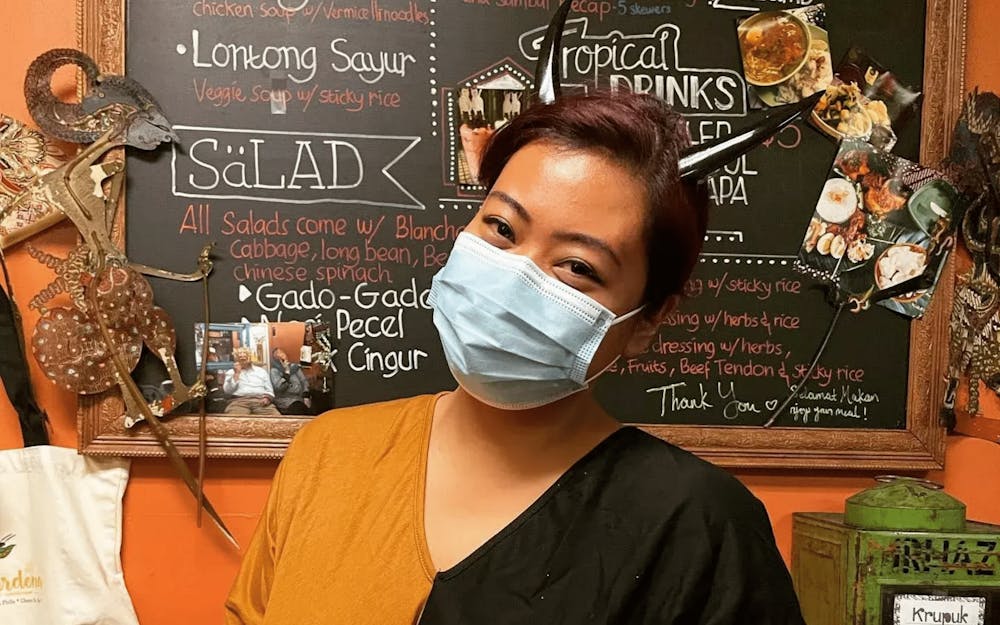Nestled in a heavily residential area, Hardena’s quaint location at the corner of Hicks and Moore streets conceals its significant impact on food and social justice. The restaurant’s drive and passion for sharing Indonesian culture and cuisine extends well beyond its local South Philly community, reaching every corner of America and the world. With almost 20,000 followers on Instagram and visits from well–renowned foodies like Guy Fieri, Hardena is a pioneer in blending activism, social media, and delicious meals.
Hardena was first founded in the early 2000s by the parents of current co–owner Diana Widjojo to serve the Indonesian population in Philly. Her mother’s friends “were encouraging her to open a spot here because there weren’t many [Indonesian restaurants] back then. But there were a lot of Indonesians, probably about 10,000 of us here,” Widjojo says.
After Widjojo and her sister Maylia took over the restaurant in 2017, they continued to share their parents’ passion for promoting Indonesian cuisine in the city. “I wanted to spread awareness of Indonesian culture because we had no representation. Everybody knows Chinese or Japanese food, but there weren’t really any restaurants or figures that represented Indonesia,” says Widjojo.
In the few years of this new era for Hardena, the Widjojo sisters have already been extremely successful in their marketing of Indonesian food. One of their innovations: Besides offering traditional Indonesian fare such as tempeh and sate, Hardena also has dishes like rijsttafel on its menu. The Dutch word for "rice table" and originating from Dutch colonialism of Indonesia, rijsttafel features rice on a “big circular wooden board” surrounded by a plethora of side plates, each containing a sample of Indonesian cuisine. When the COVID–19 pandemic hit, this was the dish customers were still clamoring for despite the restaurant being takeout only.
“I don’t know how we would be able to do it. How could I put it in to–go containers and have the same visual effects?” Widjojo says. “And then one day, I was having pizza and I’m looking at the pizza box. What if I took out the pizza and laid it with a banana leaf so it won’t leak?”
Thus began the #NotPizza trend, which has spread to eateries all over the country. The restaurant started using cardboard boxes for its rijsttafel—rather than holding pizzas, these containers included a delicious and visually stunning assortment of meats next to a selection of fruits and vegetables. Even though rijsttafel is difficult to safely pack and carry without damaging the dish's structural integrity, Hardena did it with creativity and innovation.
Other businesses started to take note. Stina Pizzeria in Philly incorporated Greek specialties in its boxes, and Filipino restaurant Patikim in New York City made its own vegan kamayan box. Not expecting the idea to be spread so quickly, Widjojo was flattered by the attention and spin–offs. “One day I was like, 'I’m just going to try it. I’m going to post this and I’ll see how it fares on the internet,' and it just blew up. I was like, 'I started a trend!'”
Besides #NotPizza and combining the flavors of Indonesia into a box, Hardena has also been active in spreading awareness of Indonesian culture. In 2021, a mural highlighting Indonesian and other minority Asian groups was painted over Hardena’s exterior.
“If you were one of our original customers, there was absolutely nothing to the restaurant,” Widjojo recalls. “It was just plain white, and it didn’t have any color. But slowly, I introduced color. I’ve always wanted to do a mural. I told the Mayor’s Commission [on Asian Pacific American Affairs] my idea: a mural outside that represents Indonesia. There’s such a big community here, but we don’t really have anything. I’m really glad that an Indonesian artist was able to work with us and that we could incorporate not just Indonesians but also Cambodian and Vietnamese people.”
To celebrate the finished mural, Hardena held a big block party at the restaurant. It was an important moment to acknowledge Indonesian food, culture, and arts, as well as Hardena’s journey from local favorite to national recognition. To continue appreciating Asian culture, Widjojo has a bigger festival in the works. “It’s going to be called Celebrate Asia at Race Street Pier. Right now, I have a few vendors from different regions of Asia, and we’re planning to have different performances. The city wants to see more of that, but the block party was just one block. So we’re going to make it big.”
These festivities have created an important role for Hardena to be not only a restaurant but also a place that actively supports its community and neighborhood. During the pandemic, Widjojo and some friends created a group that gave care packages and necessities to the people that needed them. Each bag had items like fresh produce or masks, and their efforts reached hundreds of people.
For Hardena and Widjojo, balancing restaurant management and community engagement is a tough but rewarding task. But Widjojo is passionate about what she does, and her work gives her energy and motivation. The future of Hardena, including both its food and its advocacy, is in the right hands.







